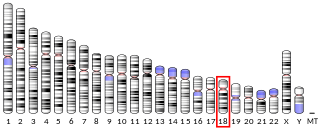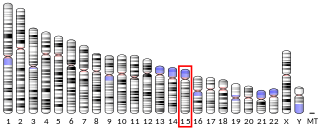
Fibrocystin is a large, receptor-like protein that is thought to be involved in the tubulogenesis and/or maintenance of duct-lumen architecture of epithelium. FPC associates with the primary cilia of epithelial cells and co-localizes with the Pkd2 gene product polycystin-2 (PC2), suggesting that these two proteins may function in a common molecular pathway.

Fatty aldehyde dehydrogenase is an aldehyde dehydrogenase enzyme that in human is encoded in the ALDH3A2 gene on chromosome 17. Aldehyde dehydrogenase enzymes function to remove toxic aldehydes that are generated by the metabolism of alcohol and by lipid peroxidation.

Probable G-protein coupled receptor 179 is a protein that in humans is encoded by the GPR179 gene.

Desmoglein-4 is a protein that in humans is encoded by the DSG4 gene.

Interferon gamma receptor 2 also known as IFN-γR2 is a protein which in humans is encoded by the IFNGR2 gene.

Neurofilament, heavy polypeptide (NEFH) is a protein that in humans is encoded by the NEFH gene.

Mitochondrial glycine transporter is a protein that in humans is encoded by the SLC25A38 gene. SLC25A38 is involved in mitochondrial handling of glycine and is needed for the first step in heme synthesis. Mutations in this gene can lead to an autosomal recessive form of sideroblastic anemia.

Dynein axonemal intermediate chain 2 also known as axonemal dynein intermediate chain 2, is a protein that in humans is encoded by the DNAI2 gene.

Dynein axonemal light chain 1, (LC1) is a protein that in humans is encoded by the DNAL1 gene.

Gap junction gamma-2 (GJC2), also known as connexin-46.6 (Cx46.6) and connexin-47 (Cx47) and gap junction alpha-12 (GJA12), is a protein that in humans is encoded by the GJC2 gene.

Espin, also known as autosomal recessive deafness type 36 protein or ectoplasmic specialization protein, is a protein that in humans is encoded by the ESPN gene. Espin is a microfilament binding protein.

Synaptotagmin XIV is a protein that in humans is encoded by the SYT14 gene.

Solute carrier family 13 (sodium-dependent citrate transporter), member 5 also known as the Na+/citrate cotransporter or mIndy is a protein that in humans is encoded by the SLC13A5 gene. It is the mammalian homolog of the fly Indy gene.

Coenzyme Q6 monooxygenase is a protein that in humans is encoded by the COQ6 gene.

Solute carrier family 7, member 14 is a protein that in humans is encoded by the SLC7A14 gene.

Cilia and flagella associated protein 53 is a protein that in humans is encoded by the CFAP53 gene.

Zinc finger protein 592 is a protein that in humans is encoded by the ZNF592 gene.

Synaptonemal complex central element protein 1 is a protein that in humans is encoded by the SYCE1 gene.

Otogelin is a protein that in humans is encoded by the OTOG gene.

Forkead box I3 (FOXI3) is a protein that in humans is encoded by the FOXI3 gene. FOXI3 is a forkhead box transcription factor that is expressed in the development of hair and teeth. One of its mutations is a dominant allele responsible for the heterozygous Hh hairless trait in dogs. It was identified in 2008.















